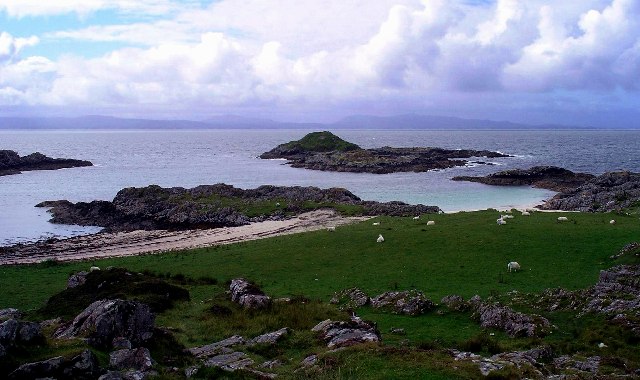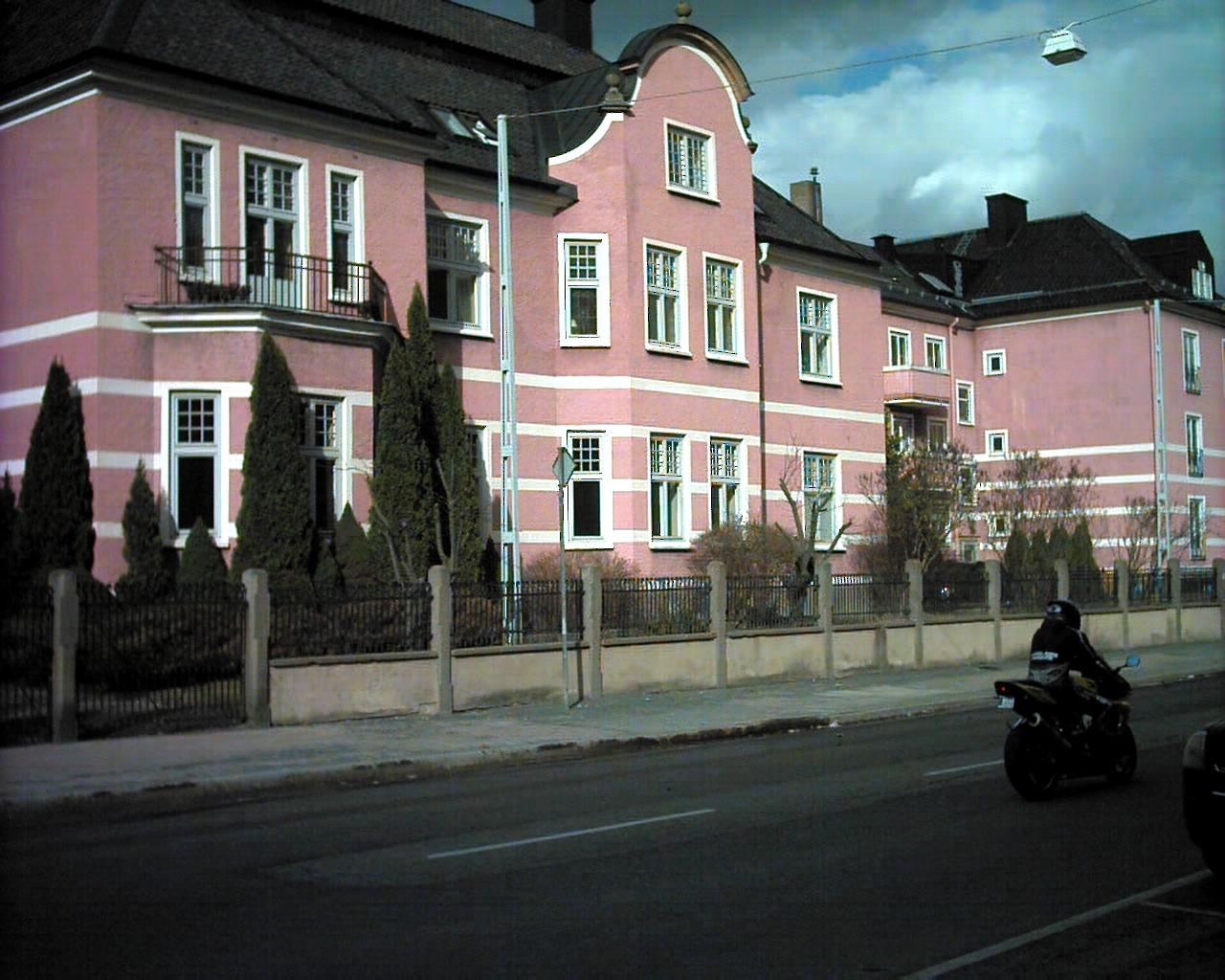|
Grace Wyndham Goldie
Grace Wyndham Goldie (née Grace Murrell Nisbet; 26 March 1900 – 3 June 1986) was a British producer and executive in television for twenty years, particularly in the fields of politics and current affairs. During her career at the BBC, she was one of the few senior women in an establishment dominated by men. Beginning as a radio producer, Wyndham Goldie soon moved into television and pioneered many of the formats now taken for granted in Britain. She became Head of Talks and later Head of the Current Affairs Group at BBC Television. David Attenborough described her as "one of the most influential of television's pioneers ..During her career she helped and encouraged countless people who were working in the medium and excited by its possibilities." Early life She was born Grace Murrell Nisbet in Arisaig, a small village in the western Scottish Highlands. Much of her childhood was spent in Egypt, where her father worked as a civil engineer, and she attended a French Catholic co ... [...More Info...] [...Related Items...] OR: [Wikipedia] [Google] [Baidu] |
Arisaig
Arisaig ( gd, Àrasaig) is a village in Lochaber, Inverness-shire. It lies south of Mallaig on the west coast of the Scottish Highlands, within the Rough Bounds. Arisaig is also the traditional name for part of the surrounding peninsula south of Loch Morar, extending east to Moidart. Etymologically, Arisaig means "safe bay". It lies in the Scottish council area of Highland and has a population of about 300. Prehistory Realignment of a 6 km section of the A830 road in Arisaig led to archaeological investigations in 2000–2001 by the Centre for Field Archaeology (CFA), the University of Edinburgh, and Headland Archaeology Ltd, which found a Bronze Age kerb cairn, turf buildings and shieling huts. The shielings were repeatedly reused through the medieval and post-medieval periods, but themselves were on top of Bronze Age remains. Analysis of peat cores has revealed a history of continuous, but gradual decline in woodland, starting in about 3200 BC and continuing to the p ... [...More Info...] [...Related Items...] OR: [Wikipedia] [Google] [Baidu] |
Representation Of The People Act 1948
The Representation of the People Act 1948 was an Act of the Parliament of the United Kingdom that altered the law relating to parliamentary and local elections. It is noteworthy for abolishing plural voting for parliamentary elections, including by the abolition of the twelve separate university constituencies; and for again increasing the number of members overall, in this case to 613. Part I: Parliamentary Franchise and its Exercise Part I of the Act declared that in future the United Kingdom would be divided into single-member borough constituencies and county constituencies. These terms replaced the former designations of parliamentary borough/division of a parliamentary borough and parliamentary county/division of a parliamentary county (in Scotland "burgh constituencies" replaced parliamentary burghs). There were to be 613 such constituencies, in place of the 591 under previous legislation. These were to be the only constituencies, and the Act thus abolished the universit ... [...More Info...] [...Related Items...] OR: [Wikipedia] [Google] [Baidu] |
Huw Wheldon
Sir Huw Pyrs Wheldon, (7 May 1916 – 14 March 1986) was a Welsh broadcaster and BBC executive. Early life Wheldon was born on 7 May 1916 in Prestatyn, Flintshire, Wales. He was educated at Friars School, Bangor, at the time an all-boys grammar school, and graduated with a BSc(Econ) degree from the London School of Economics in 1938. His father, Sir Wynn Wheldon, was a prominent educationalist who had been awarded the DSO for gallantry in the First World War. His grandfather, Tomos Jones Wheldon, had been the Moderator of the Calvinist Methodist Church in Wales. His mother, Megan Edwards, was an accomplished pianist. Military service On the outbreak of war in 1939, Wheldon enlisted in the Buffs. He was commissioned into the Royal Welch Fusiliers in 1940, but subsequently volunteered for the airborne forces and joined the Royal Ulster Rifles, with whom he flew into Normandy. He was awarded the Military Cross for an act of bravery on D-Day + 1. Broadcasting career After th ... [...More Info...] [...Related Items...] OR: [Wikipedia] [Google] [Baidu] |
Alasdair Milne
Alasdair David Gordon Milne (8 October 19308 January 2013) was a British television producer and executive. He had a long career at the BBC, where he was eventually promoted to Director-General, and was described by ''The Independent'' as "one of the most original and talented programme-makers to emerge during television's formative years". In his early career, Milne was a BBC producer and was involved in founding the current affairs series ''Tonight'' in 1957. Later, after a period outside the BBC, he became controller of BBC Scotland and BBC Television's director of programmes. He served as Director-General of the BBC between July 1982 and January 1987, when he was forced to resign from his post by the BBC Governors following several difficult years for the BBC, which included sustained pressure from the Thatcher government about editorial decisions which had proved controversial. Early life Milne was born in British India to Charles Gordon Shaw Milne, an Aberdonian surgeon ... [...More Info...] [...Related Items...] OR: [Wikipedia] [Google] [Baidu] |
Monitor (UK TV Series)
''Monitor'' is a British arts television programme that was launched on 2 February 1958 on BBC and ran until 1965. Huw Wheldon was the editor from 1958 to 1962. He was also the principal interviewer and anchor until 1964. Wheldon set about moulding a team of talents, including W. G. Archer, Melvyn Bragg, Humphrey Burton, John Berger, Patrick Garland, Peter Newington, Ken Russell, John Schlesinger, Nancy Thomas, and Alan Tyrer. ''Monitor'' ranged in subject over all the arts. The role as editor of the series was passed to Humphrey Burton in July 1962, lasting a year. He was succeeded by David Jones who had worked on the series since the beginning. The hundredth programme, made in 1962, was a film directed by Ken Russell and written by Wheldon, the celebrated ''Elgar''. The ''Elgar'' film was innovative because it was the first time that an arts programme showed one long film about an artistic figure instead of short items, and it was the first time that re-enactments we ... [...More Info...] [...Related Items...] OR: [Wikipedia] [Google] [Baidu] |
Tonight (1957 TV Series)
''Tonight'' was a British current affairs television programme, presented by Cliff Michelmore, that was broadcast on BBC live on weekday evenings from 18 February 1957 to 18 June 1965. The producers were the future Controller of BBC1 Donald Baverstock and the future Director-General of the BBC Alasdair Milne. The audience was typically seven million viewers. BBC TV background ''Tonight'' was, like ''Six-Five Special'', created by the BBC to fill in the " Toddlers' Truce" closed period between 6.00pm and 7.00pm (the 'Truce' was officially abolished only a few days before ''Tonight'' was first broadcast). ''Tonight'' began broadcasting from the Viking studio in Kensington, known by the BBC as "studio M". It eventually transferred to one of the main studios in Lime Grove, Shepherd's Bush, west London.History of ... [...More Info...] [...Related Items...] OR: [Wikipedia] [Google] [Baidu] |
Robin Day
Sir Robin Day (24 October 1923 – 6 August 2000) was an English political journalist and television and radio broadcaster. Day's obituary in ''The Guardian'' by Dick Taverne stated that he was "the most outstanding television journalist of his generation. He transformed the television interview, changed the relationship between politicians and television, and strove to assert balance and rationality into the medium's treatment of current affairs". Early life Day was born in Hampstead Garden Suburb, London, the youngest of four children of William Day (c. 1885- c. 1948) a Post Office telephone engineer who became a GPO administrative manager, and his wife Florence. He received his early formal education at Brentwood School from 1934 to 1938, briefly attended the Crypt School, Gloucester, and later Bembridge School on the Isle of Wight. During World War II he received a commission into the British Army's Royal Artillery, with which he served from 1943. He was deployed to ... [...More Info...] [...Related Items...] OR: [Wikipedia] [Google] [Baidu] |
Richard Dimbleby
Frederick Richard Dimbleby (25 May 1913 – 22 December 1965) was an English journalist and broadcaster, who became the BBC's first war correspondent, and then its leading TV news commentator. As host of the long-running current affairs programme ''Panorama'', he pioneered a popular style of interviewing that was respectful but searching. At formal public events, he could combine gravitas with creative insights based on extensive research. He was also able to maintain interest throughout the all-night election specials. The annual Richard Dimbleby Lecture was founded in his memory. Biography Early life Dimbleby was born near Richmond, Surrey, the son of Gwendoline Mabel (Bolwell) and Frederick Jabez George Dimbleby, a journalist. He was educated at The Mall School, Twickenham, and at Mill Hill School, and began his career in 1931 on the ''Richmond and Twickenham Times'', which his grandfather, Frederick William Dimbleby, had acquired in 1894. He then worked as a news r ... [...More Info...] [...Related Items...] OR: [Wikipedia] [Google] [Baidu] |
Panorama (TV Series)
A panorama (formed from Greek πᾶν "all" + ὅραμα "view") is any wide-angle view or representation of a physical space, whether in painting, drawing, photography, film, seismic images, or 3D modeling. The word was originally coined in the 18th century by the English (Irish descent) painter Robert Barker to describe his panoramic paintings of Edinburgh and London. The motion-picture term ''panning'' is derived from ''panorama''. A panoramic view is also purposed for multimedia, cross-scale applications to an outline overview (from a distance) along and across repositories. This so-called "cognitive panorama" is a panoramic view over, and a combination of, cognitive spaces used to capture the larger scale. History The device of the panorama existed in painting, particularly in murals, as early as 20 A.D., in those found in Pompeii, as a means of generating an immersive "panoptic" experience of a vista. Cartographic experiments during the Enlightenment era prece ... [...More Info...] [...Related Items...] OR: [Wikipedia] [Google] [Baidu] |
Cecil McGivern
Cecil McGivern CBE (22 May 1907, in Newcastle, England – 30 January 1963, in Buckinghamshire, England) was a British broadcasting executive, who initially worked for BBC Radio before transferring to BBC Television in the late 1940s. From 1950 to 1957 he served as the Controller of BBC Television Service, succeeding Norman Collins. Early life and career The son of Irish immigrants, McGivern was educated at St Cuthbert's Grammar School and later attended Durham University. His initial ambition was to be an actor (he played the central role in the première of the thriller ''Land's End'' at the People's Theatre, Newcastle upon Tyne, in 1935), but he quickly realised that he lacked the necessary talent and so pursued a career as a teacher instead. He did, however, continue working in the theatre as a producer of amateur productions. Career McGivern joined the BBC in 1936, working as a producer of drama and documentary programmes in his native Newcastle and also in Manchest ... [...More Info...] [...Related Items...] OR: [Wikipedia] [Google] [Baidu] |
Berlin
Berlin ( , ) is the capital and largest city of Germany by both area and population. Its 3.7 million inhabitants make it the European Union's most populous city, according to population within city limits. One of Germany's sixteen constituent states, Berlin is surrounded by the State of Brandenburg and contiguous with Potsdam, Brandenburg's capital. Berlin's urban area, which has a population of around 4.5 million, is the second most populous urban area in Germany after the Ruhr. The Berlin-Brandenburg capital region has around 6.2 million inhabitants and is Germany's third-largest metropolitan region after the Rhine-Ruhr and Rhine-Main regions. Berlin straddles the banks of the Spree, which flows into the Havel (a tributary of the Elbe) in the western borough of Spandau. Among the city's main topographical features are the many lakes in the western and southeastern boroughs formed by the Spree, Havel and Dahme, the largest of which is Lake Müggelsee. Due to its l ... [...More Info...] [...Related Items...] OR: [Wikipedia] [Google] [Baidu] |
Dag Hammarskjöld
Dag Hjalmar Agne Carl Hammarskjöld ( , ; 29 July 1905 – 18 September 1961) was a Swedish economist and diplomat who served as the second Secretary-General of the United Nations from April 1953 until his death in a plane crash in September 1961. As of 2022, he remains the youngest person to have held the post, having been only 47 years old when he was appointed. Hammarskjöld's tenure was characterized by efforts to strengthen the newly formed UN both internally and externally. He led initiatives to improve morale and organisational efficiency while seeking to make the UN more responsive to global issues. He presided over the creation of the first UN peacekeeping forces in Egypt and the Congo and personally intervened to defuse or resolve diplomatic crises. Hammarskjöld's second term was cut short when he died in a plane crash while en route to cease-fire negotiations during the Congo Crisis. Hammarskjöld was and remains well regarded internationally as a capable diplomat a ... [...More Info...] [...Related Items...] OR: [Wikipedia] [Google] [Baidu] |





